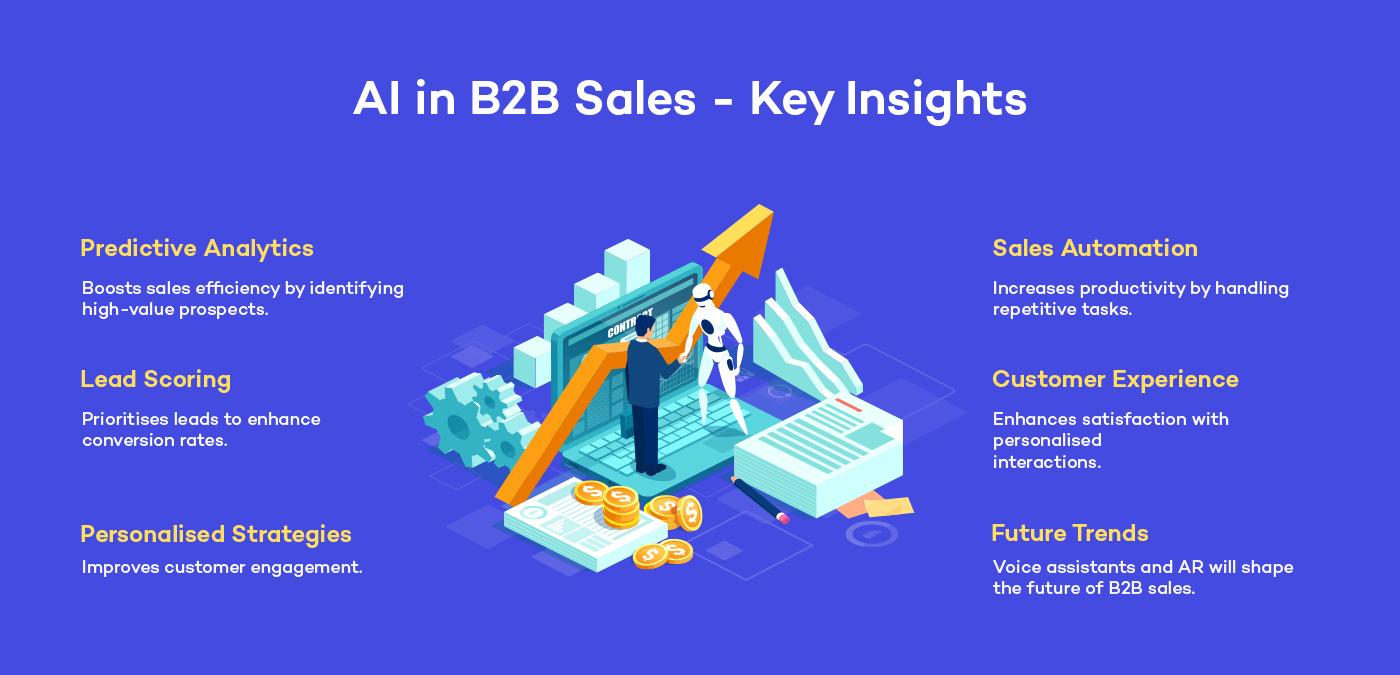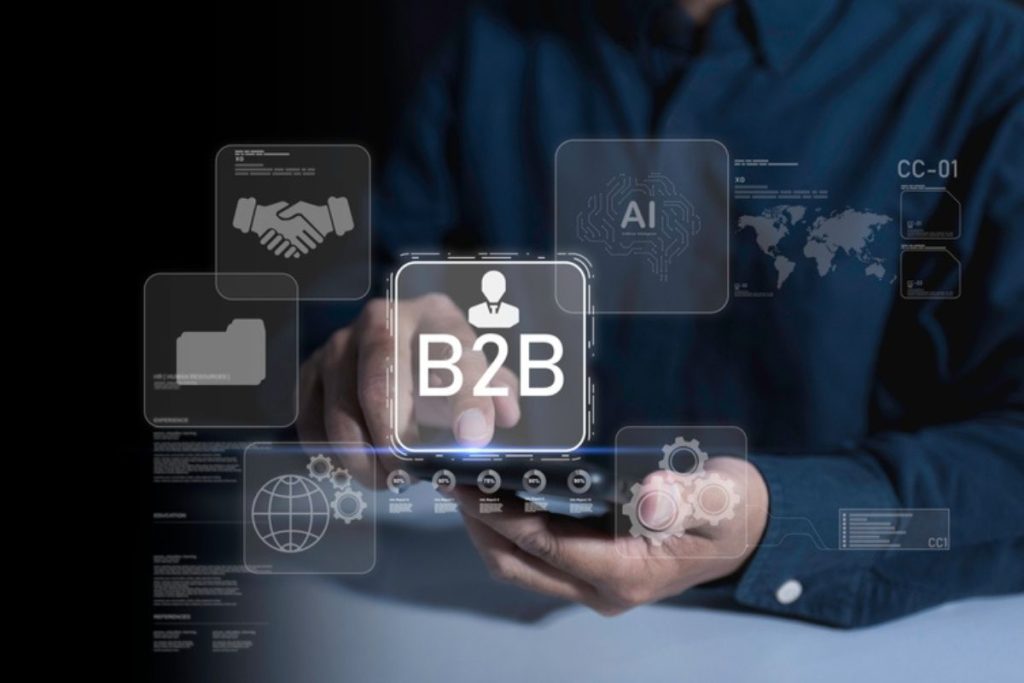AI Automation for B2B: Strategies to Boost Your Company Efficiency
AI automation in the B2B sector offers a critical possibility for organizations to boost their performance. By simplifying processes and boosting decision-making, organizations can accomplish substantial effectiveness. The effective combination of AI requires cautious consideration of different variables. Comprehending which locations to automate and selecting proper devices are just the start. The possibility for transformation raises vital questions about execution and continuous evaluation. What techniques will guarantee enduring success in this developing landscape?
Recognizing AI Automation in B2B Context
As businesses significantly seek effectiveness and technology, recognizing AI automation in the B2B context becomes important. AI automation leverages sophisticated innovations to simplify procedures, boost decision-making, and enhance total performance. By incorporating AI tools, firms can maximize procedures such as supply chain monitoring, client connection monitoring, and information evaluation. These modern technologies can analyze large amounts of data rapidly, offering workable understandings that drive calculated efforts. Furthermore, AI-driven automation decreases human error and maximizes employees to concentrate on even more facility jobs. By promoting partnership between human intelligence and equipment abilities, services can accomplish an one-upmanship. Ultimately, understanding AI automation is essential for B2B companies aiming to flourish in an increasingly electronic industry.
Determining Areas for Automation
In the pursuit for reliable AI automation in B2B, it is vital to determine particular locations where automation can produce significant advantages. This includes evaluating job repetitiveness, exploring opportunities for information handling, and determining process bottlenecks. By concentrating on these aspects, companies can improve procedures and boost efficiency.
Task Repetitiveness Analysis
Task repetitiveness evaluation plays a vital role in recognizing areas ripe for automation within B2B procedures. This process entails evaluating daily tasks to establish which are recurring and taxing, thus impeding productivity. By looking at operations, services can determine particular features that require extreme hand-operated input, such as information entry, billing handling, or consumer follow-ups. Recognizing these repeated jobs allows organizations to assign sources better, enhancing general effectiveness (AI Automation For B2B). Furthermore, automation can reduce human mistake, simplify operations, and liberate staff members to concentrate on higher-value activities. Conducting a thorough job repetitiveness assessment empowers B2B organizations to embrace targeted automation approaches, inevitably driving improved efficiency and competitive benefit in the industry
Information Handling Opportunities
Countless information handling possibilities exist within B2B companies, offering considerable capacity for automation. These chances often emerge in locations such as information access, billing handling, and client connection monitoring. By automating data collection and recognition procedures, companies can lower human mistake and boost performance. In addition, automating record generation allows groups to accessibility real-time understandings, promoting prompt decision-making. Inventory monitoring systems can likewise benefit from automation, simplifying stock monitoring and order handling. Furthermore, leveraging AI in data analytics enables organizations to discover fads and patterns that might otherwise go undetected. Inevitably, accepting automation in these areas not only optimizes procedures however also releases up important sources, enabling employees to concentrate on calculated initiatives that drive growth.
Workflow Traffic Jam Recognition
Recognizing operations bottlenecks is a crucial action in recognizing the complete benefits of automation within B2B companies. These bottlenecks commonly manifest as hold-ups, source constraints, or ineffective procedures that hinder performance. To effectively identify these locations, companies can perform comprehensive evaluations of their workflows, using metrics such as cycle time and throughput. Involving employees in discussions concerning discomfort points can likewise supply important understandings. Organizations can prioritize them based on influence and feasibility for automation when bottlenecks are determined. By purposefully dealing with these inadequacies, B2B firms can streamline procedures, enhance cooperation, and ultimately improve total performance. This aggressive approach to workflow evaluation prepares for effective automation campaigns that drive business growth.
Selecting the Right AI Equipment and Technologies
As companies significantly transform to AI to improve their operations, picking the right devices and modern technologies comes to be important for accomplishing preferred results. Organizations should examine their particular requirements and objectives, considering elements such as compatibility, scalability, and user-friendliness. An extensive market evaluation can aid recognize leading AI options tailored for their industry. In addition, services must evaluate the technological framework required to sustain these tools, making certain smooth combination with existing systems. Data safety and compliance with laws are additionally important considerations that affect device option. By concentrating on these criteria, firms can make informed decisions that drive performance and efficiency, ultimately resulting in boosted business efficiency. The appropriate AI devices equip organizations to introduce and maintain an affordable edge in the market.
Creating a Tactical Execution Strategy
A successful strategic application plan for AI automation in B2B requires clearly defined key goals. Business Process Automation. Additionally, companies need to examine their current capabilities to identify voids and chances for improvement. Constant monitoring and adjustment of the strategy will certainly assure positioning with developing service needs and technology innovations
Specify Secret Objectives
To guarantee effective AI automation in B2B environments, defining key purposes is vital for developing a calculated implementation strategy. Organizations must identify details, measurable objectives that align with their general business method. This clarity supplies a roadmap for the automation procedure, guaranteeing that initiatives are concentrated on areas that will certainly yield the greatest effect. Key goals might consist of improving functional performance, enhancing customer contentment, or boosting earnings. Setting these goals makes it possible for teams to prioritize sources effectively and track progress gradually. In addition, clear objectives help with much better communication amongst stakeholders, cultivating partnership and alignment throughout the company. Inevitably, well-defined objectives work as the structure for a durable AI automation technique that drives service efficiency.
Analyze Existing Capabilities

Monitor and Readjust
Executing AI automation requires a vibrant approach that highlights continuous surveillance and modification - Minarik AI. Companies should establish a tactical implementation strategy that incorporates normal analyses of AI performance versus predefined metrics. This includes tracking crucial performance indicators (KPIs) to assess the performance of automation remedies. By examining data, organizations can recognize locations for renovation and adjust their AI systems as necessary. Involving with stakeholders throughout the procedure assures that the automation straightens with company purposes and individual needs. Additionally, cultivating a society of versatility allows firms to react quickly to changing market problems and technological developments. Ultimately, recurring tracking and modification not just improve operational performance yet likewise drive continual service performance in the affordable B2B landscape
Ensuring Data Quality and Combination
As organizations increasingly depend on AI automation in B2B processes, ensuring information high quality and assimilation ends up being vital for success. Top quality information is vital for exact analytics, educated decision-making, and efficient consumer engagement. Information should be cleaned, standardized, and validated to remove errors and incongruities that could bring about misdirected understandings. Additionally, seamless integration throughout numerous platforms and systems is imperative; inconsonant data silos impede automation initiatives and reduce operational performance. Organizations should adopt durable data governance frameworks and use advanced tools to help with information integration while preserving top quality standards. By prioritizing these aspects, organizations can boost their AI automation initiatives, eventually bring about boosted performance and a competitive benefit in the B2B landscape.
Gauging Success and ROI of AI Initiatives
Just how can companies effectively determine the success and return on financial investment (ROI) of their AI campaigns? To determine efficiency, companies must establish clear, measurable goals straightened with strategic purposes. Key performance indications (KPIs) such as price financial savings, earnings growth, and efficiency improvements can offer important insights. Organizations frequently carry out standard evaluations before applying AI, enabling them to contrast pre- and post-implementation metrics. Furthermore, examining client satisfaction and involvement can disclose the effect of AI on individual experience. Consistently assessing these metrics assists in refining AI techniques and making sure positioning with company goals. By using an organized technique to measurement and analysis, companies can properly examine the efficiency of their AI initiatives and make informed decisions regarding future investments.
Overcoming Obstacles in AI Adoption

Regularly Asked Inquiries
How Can AI Automation Improve Consumer Partnership Monitoring in B2B?
AI automation can enhance client partnership management in B2B by streamlining communication, giving customized interactions, examining client data for insights, automating follow-ups, and enhancing reaction times, eventually fostering stronger relationships and driving sales growth.
What Industries Advantage The Majority Of From AI Automation in B2B?
Production, money, medical care, and logistics markets profit most from AI automation in B2B. These markets take advantage of automation to enhance procedures, enhance information evaluation, enhance consumer communications, and inevitably boost functional performance and productivity.
How Does AI Automation Effect Employee Roles in B2B Firms?
AI automation changes employee functions in B2B business by streamlining jobs, lowering recurring job, and enabling team to concentrate on critical efforts. This shift boosts productivity and fosters a society of technology and versatility.
What Are the Prices Related To Implementing AI Automation?
The costs associated with applying AI automation include first software program acquisition, framework upgrades, training costs, continuous maintenance, and potential combination challenges. Minarik AI. Companies should likewise consider lasting functional changes and worker adaptation costs in their monetary preparation
Exactly How Can Companies Make Certain Moral AI Usage in Their Workflow?
Companies can ensure honest AI use by establishing clear standards, advertising openness, carrying out regular audits, entailing varied stakeholders, and focusing on data privacy. Continual training and recognition programs better boost understanding and adherence to honest practices.
As businesses increasingly look for effectiveness and development, understanding AI automation in the B2B context becomes essential. In the mission for effective AI automation in B2B, it is essential to recognize certain areas where automation can generate considerable benefits. An effective calculated implementation plan for AI automation in B2B needs clearly specified crucial goals. To guarantee effective AI automation in B2B environments, specifying crucial objectives is crucial for establishing a critical execution strategy. As organizations increasingly count on AI automation in B2B procedures, guaranteeing data quality and combination becomes crucial for success.